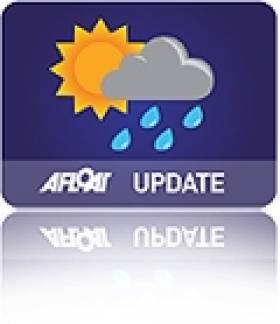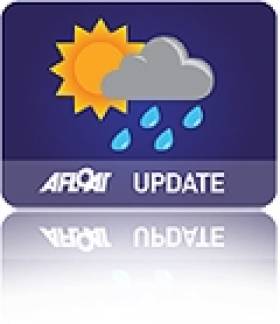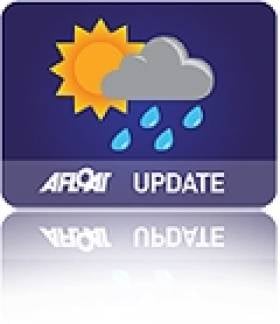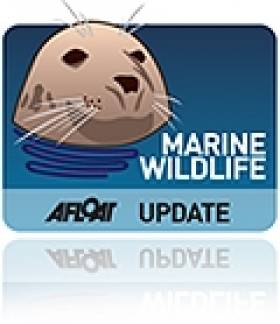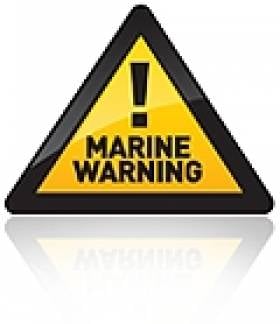Displaying items by tag: Gale
Met Éireann Issues 'Yellow' Alert As Strong Gales Sweep Coast
#Weather - Met Éireann has issued a 'yellow' weather alert for coastal areas around Ireland today (4 February) as winds are expected to reach speeds of up to 110km/h.
Westerly winds will continue to reach gale force or strong gale force this evening and tonight on all Irish coastal waters and on the Irish Sea.
Severe gusts of 90 to 110 km/h are predicted for Connacht, Donegal and in coastal areas of Munster. Elsewhere winds will gust between 80 and 90 km/hr.
After dark, showers will become increasingly wintry with the possibility of snow and even blizzard-like conditions, especially in the north and west on high ground.
But meteorologists say that any lying snow will melt during the course of tomorrow morning and afternoon as temperatures rise.
Summer Gale Threatens Sailing Fixtures
#weather – A deep area of low pressure off Southern Ireland with fronts pushing north threatens to disrupt a number of sailing events on the Irish Sea from this afternoon including tonight's regular Dublin Bay Sailing Club (DBSC) 200 boat plus racing and even tomorrow night's fiftieth Ailsa Craig race from Belfast Lough.
South easterly winds will be increasing and gales are expected today. Thickening cloud and outbreaks of rain through this afternoon. The rain becoming more persistent as the day progresses.
Depending on how fast the fronts move weekend sailing may also be affected, the hope being that the gale will have passed through before the Ruffian Nationals begin at the Royal St. George Yacht Club in Dun Laoghaire and the Laser Leinster championships start in Howth.
There will be further rain through this evening, this becoming heavy at times.
Winds will be to gale force later, and visibility will become increasingly moderate in rain, then poor later. Sea state will be rough then very rough.
Dun Laoghaire marina has issued a forecast that warns of SE 25-28kt - SE 30-38kt from 6pm this evening.
Ireland Battered by Storm-Force Winds
#WEATHER - Ireland has been warned to brace for further strong winds set to sweep across the country today (4 January),
The Irish Times reports. Winds reaching near hurricane speeds have affected coastal communities in the north and northwest, peaking at a remarkable 168km/h in Donegal.
Thousands of euro worth of damage was caused when the roofs of traditional thatched cottages at Cruit Island in west Donegal were blown away.
But the west and east have also been hard hit, with storm-force gales exceeding 100km/h uprooting trees and disrupting electricity supply.
As previously reported on Afloat.ie, ferry services on the east coast have been severely affected. Irish Ferries cancelled two fast ferries from Dublin to Holyhead yesterday, and today's early Jonathan Swift sailings between Dublin and Holyhead were also cancelled.
Met Éireann expects wind speeds to be lower today, but could still reach 90-120km/h in some areas.
The Irish Times has much more on the story HERE.
Storm Force Wind Warning In Effect for Irish Coast
#WEATHER - The Irish Coast Guard has warned people to stay away from cliff paths and other coastal areas as near hurricane force winds continue to batter the country, the Irish Examiner reports.
As of this morning, Met Éireann was expecting gusts of up to 140 kilometres an hour in Connacht and Ulster.
All Irish coastal areas are expected to experience strong gales. Winds will occasionally reaching violent storm force 11 on coasts from Rossan Point to Malin Head to Fair Head this afternoon, according to meteorologists.
Whale Carcass Battered by Strong Sea Gales in Sligo
#MARINE WILDLIFE - The Irish Independent reports on the carcass of a whale that was strewn on a beach in Co Sligo after it was swept into rocks by Monday's gale-force winds.
The 13-metre fin whale had been seen recently on a number of occasions in Lough Hyne, a saltwater lake near Baltimore in Co Cork.
On Monday it was spotted at Raughley in the north of Sligo, where it was found beached by Jimmy and Viera Stupakova after the treacherous conditions of the early part of this week.
The find marks the fifth recorded stranding of the species in Irish waters, and the first validated record of a fin whale in Co Sligo, according to OutdoorCommunity.ie.
It is not yet clear how the juvenile met its end, though initial investigations point to the whale not being long dead.
The Irish Independent has more on the story, including video, HERE.
Gale force westerly winds Gusting to 140km/h
Met Eireann have issued a severe weather warning.
Southerly gales or strong gales developing this evening and for a time tonight on all coasts and on the Irish Sea. Winds veering westerly tonight and continuing to reach gale force on coasts from Roches Point to Erris Head to Malin Head overnight.
Stormy conditions will affect Ireland Thursday afternoon, evening and for much of Thursday night. Gale force westerly winds will gust between 100 and 120 km/hr generally, but gusts of up to 140 km/hr are expected in exposed parts of Connacht and Ulster. These winds are likely to lead to some structural damage and will be accompanied by high seas on Atlantic coasts. Winds will moderate considerably towards dawn on Friday.
More HERE


























